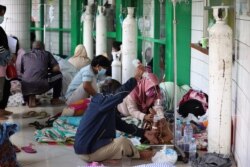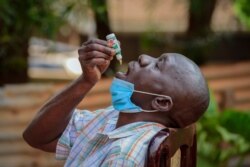The head of the World Health Organization said drugmakers should not try to provide coronavirus booster shots to wealthy nations when many poor nations have yet to receive a first dose of vaccines for much of their population.
At a press briefing in Geneva, Switzerland, on Monday, WHO chief Tedros Adhanom Ghebreyesus said the priority should be to vaccinate people who had not received any doses.
He called on drugmakers Pfizer and Moderna to "go all out to supply COVAX," referring to the U.N.-backed initiative to distribute vaccines globally, as well as to target vaccine distribution to low- and middle-income countries.
Pfizer said last week it was seeking U.S. federal authorization for a third dose of its COVID-19 vaccine to be used as a booster shot.
"The global gap in COVID-19 vaccine supply is hugely uneven and inequitable. Some countries and regions are actually ordering millions of booster doses before other countries have had supplies to vaccinate their health workers and most vulnerable," Tedros said.
He said the disparity meant "we are making conscious choices right now not to protect those in need."
WHO has said that more than 70% of all vaccines have been administered in just 10 countries.
Pfizer said it was meeting with U.S. health officials Monday to discuss its request for booster shots, which it said would boost immunity and protect people against the more contagious variants of the coronavirus.
The U.S. Centers for Disease Control and Prevention and the Federal Drug Administration said Friday they don't believe Americans need another shot yet.
Dr. Anthony Fauci, chief medical adviser to President Joe Biden, acknowledged that booster shots may be needed, but he said Sunday it was too soon for the government to recommend another shot. Roughly half of the U.S. population has been fully vaccinated.
In other developments Monday, British Prime Minister Boris Johnson confirmed that all remaining lockdown restrictions in England will be lifted in a week, despite a rise in cases blamed on the more contagious delta variant.
Johnson said during a news conference in London that people should "proceed with caution" when the restrictions are lifted.
"I cannot say this powerfully or emphatically enough — this pandemic is not over," he said.
Indonesia said Monday it set a new record of daily COVID-19 infections, with 40,427. The country is experiencing a surge of cases of the highly infectious delta variant, first identified in India.
India's Health Ministry reported Monday that the country's daily tally of new COVID-19 cases fell below 40,000 in the past 24 hours. It reported 37,154 new cases since Sunday.
In South Korea, the professional baseball league suspended its season Monday after five players from two teams tested positive for COVID-19.
The country said Monday it had recorded 1,100 new coronavirus cases on July 11, the highest ever recorded on a Sunday. The rising caseload comes as South Korea imposes new restrictions in Seoul and neighboring regions to curb the spread of infections.
Meanwhile, in Uganda, Chris Baryomunsi, a government minister, said his country had the money to buy vaccines but was having trouble purchasing them from Western countries.
"This is a challenge of access and equity," Baryomunsi, who is also an epidemiologist, told The Guardian newspaper. "We have the money, but we simply can't get the vaccine. … We have to rely on the Western world, and the Western world has focused on its population. The impression is that people there don't care about Africans."
The Johns Hopkins Coronavirus Resource Center reported nearly 187 million global COVID-19 infections early Monday and more than 4 million global deaths. The U.S. has the most cases, with 33.9 million, followed by India, with 30.9 million.
Johns Hopkins reported that nearly 3.5 billion vaccines have been administered worldwide.
Some information for this report came from Reuters and The Associated Press.








